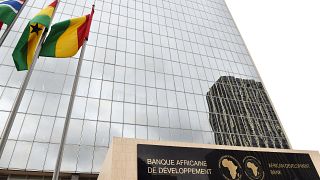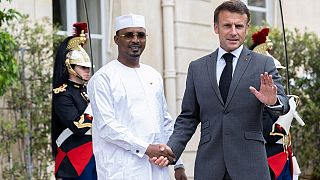Climate crisis
The President of the African Development Bank is in Paris for the Summit for a New Global Financial Pact.
Speaking Wednesday (June 21), ahead of the talks launch, Akinwumi Adesina aimed at rich countries whose financial commitments to Africa, some dating back to 2009, had not yet been honoured.
"Africa alone loses $7 to $15 billion a year because of climate change, and that's going to rise to about almost $50 billion a year by 2040. So the world has to meet its commitment, the developed countries, of the $100 billion. I mean, it's a very small amount of money compared to the scale of the problem, but by not meeting in it, it has a crisis of trust in developing countries. "
French president Macron is hosting over 50 heads of state. World finance officials and activists are also in attendance. The summit aims to seek better responses to tackle poverty and climate crisis issues by reshaping the global financial system.
Developing nations have pointed to a system where the USA, Europe and other big economies that have caused most climate damage are their main creditors and leave the poorest countries to deal with the consequences of the climate crisis.
Time for concrete steps?
The 2-day summit has no mandate to make formal decisions, organisers stressed. It rather aims to give a political impetus to key issues to be discussed in upcoming international talks such as climate conferences.
"As President Macron and others said, I don't think you're going to have a lot of new announcements made," Adesina said.
"I think the issues that announcement that needs to be made have been made. I think it's more about commitment, you know, and looking for ways in particular of how we are going to engage the private sector because that's the key. I mean, you look at the world today, you have $145 trillion of assets on their management by institutional investors. It's going to rise to that by 2026 which is just 3 years down the line, so it's very massive."
Several activists and non-governmental organizations have urged participants of the climate and finance summit ending Friday (June 23) to ensure that rich countries commit to debt relief for poor nations, including the cancellation of loans. A debt suspension clause for countries hit by extreme climatic events was also discussed.
The summit's first day included announcements of a pair of deals. French officials said debt-burdened Zambia reached a deal with several creditors including China to restructure $6.3 billion in loans. And Senegal reached a deal with the European Union and western allies to support its efforts to improve its access to energy and increase its share of renewable energy to 40% by 2030.






![Climate action demands 'real money to help communities' says Vanessa Nakate [Interview]](https://static.euronews.com/articles/stories/07/34/49/80/320x180_cmsv2_b957fc62-219d-5092-8aef-3394d1ccc3bf-7344980.jpg)






Go to video
From flood to famine: Rainfall chaos fuels Africa’s drought crisis
01:22
World will have to learn to live with heatwaves, UN says
01:36
CO2 emissions on track to push Earth beyond 1.5 degree threshold by 2028, report finds.
00:24
Greenland and Iceland saw record heat in May
01:20
UN ocean conference opens in Nice with focus on conservation, climate action
01:30
Macron sparks global push to protect oceans